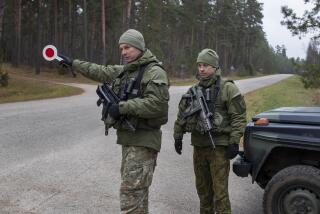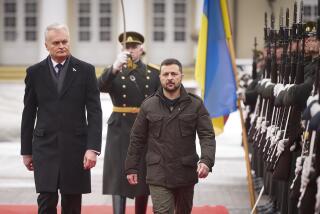Lithuanian TV Station Seized by Soviet Army : Baltic unrest: 9 killed, 79 injured as troops smash citizens’ defenses. It is Kremlin’s deadliest action yet.
- Share via
VILNIUS, Soviet Union — Soviet paratroopers, in a blaze of armored might and firepower, seized Lithuania’s radio and television center early today as Moscow tightened its hold on the Baltic republic in an effort to halt its drive for independence. Nine people were reported killed and 79 wounded.
Moving under a hail of gunfire, the troops broke through the defenses set up by more than 1,000 people who had gathered earlier to protect the center, and tanks fired at least four times over the heads of the defenders to force them to retreat.
Gunfire echoed across much of the city, and loud explosions were heard in various other areas as the troops apparently moved on other targets. Columns of tanks, armored cars and other vehicles moved along the major roads at high speed, and helicopters crisscrossed overhead.
A sound truck moved through the city telling residents that power was being assumed by the National Committee for Salvation, formed by the small pro-Soviet faction of the Lithuanian Communist Party three days ago.
“Lithuanians, do not resist,” the military said. “Your government has deceived you.”
The Lithuanian Supreme Council, the republic’s Parliament, was summoned by President Vytautas Landsbergis and went into emergency session as thousands upon thousands of its supporters flocked into central Vilnius despite the darkened streets and the military convoys.
“I think this is the beginning of the end of Lithuanian independence,” said Dr. Heronimas Maskyalyunas, former dean of medicine at Vilnius University. “But all Lithuanians remain ready to die for this.”
As the republic’s radio station was forced off the air, an announcer said: “We address all who hear us. It is possible to break us physically using force or to close our mouths, but nobody can force us to renounce freedom and independence.”
The action was by far the deadliest in President Mikhail S. Gorbachev’s determined effort to block Lithuania’s campaign for independence. Until this week, when the Soviet military began to seize Lithuanian government facilities, there had been no violence by either side since the Lithuanian Parliament declared its independence from Moscow last March.
Three people were killed outside the center and five inside as the troops fought their way up through the broadcast center and the television tower, according to a correspondent for the independent Baltic News Service who was at work in the center.
The Lithuanian government’s information bureau, quoting reports from the city’s hospitals, put the casualties at nine dead and 79 wounded, but said ambulances were still bringing people in from the broadcast center and other parts of the city.
Paratroopers had already seized other facilities Saturday in a campaign that began early last week and quickly gathered force, apparently with the intent of replacing the Landsbergis government with one loyal to the Kremlin.
“Marionettes in Lithuania are being prepared for their role,” Landsbergis said. Foreign armed might “is massing against us.”
Pro-Soviet and Communist Party loyalists, meanwhile, expressed brash confidence that they would soon replace the government, which was the first of any of the Soviet Union’s constituent republics to proclaim its independence.
“A process of the transfer of power in controlling the republic is under way,” said Juozas Jarmalavicius, an official in the National Salvation Committee, a pro-Soviet organization, whose existence was announced only 24 hours earlier. “It will not be long. Of course, the committee can count on victory.”
Pressure on Lithuania by the Soviet military increased further Saturday although the army’s moves have left unclear whether Gorbachev wants to provoke the ouster of the Landsbergis government or merely cow it into dropping its quest for independence.
Gorbachev warned Lithuania last week that he would impose “presidential rule” on the republic, apparently removing the elected government, ruling by decree and enforcing Soviet laws with troops, if necessary, to restore Soviet authority here.
In Moscow, however, the Council of the Federation, after discussing the crisis in Lithuania for much of its meeting Saturday, decided to send a five-member “mission of goodwill” to assess the situation here and suggest possible compromises.
“This will give us at least three or four days of breathing space,” said Egidijus Bichkauskas, Lithuania’s observer at the session, “but we have no guarantees that the military will suspend its actions.”
Led by Boris N. Yeltsin, president of the Russian Federation, the country’s largest constituent republic, one leader after another denounced the violence with which the military had been seizing government buildings here under a presidential decree to return them to the Communist Party and central government agencies.
Describing the central government’s use of military force against civilians as “impermissible,” Yeltsin warned the Federation Council, the country’s highest policy-making body: “This can cause the escalation of violence in this and other regions and unleash large-scale civil conflict.”
Yeltsin called for the withdrawal of the troops sent recently to Lithuania and the other Baltic republics, guarantees from Gorbachev and other leaders that further force will not be used and immediate talks between the central government and Lithuanian representatives to resolve outstanding issues.
Yeltsin’s call was endorsed almost unanimously, according to participants in the meeting, and, to Gorbachev’s apparent surprise, no one supported Boris Pugo, the Soviet interior minister, who had attempted to justify the action in Lithuania as necessary to restore law and order as well as uphold Soviet power in the republic.
“Members of the Council of the Federation understood that the use of force in the Baltic republics today could be turned into the use of force in their republics tomorrow,” Bichkauskas said.
Edgar Savisaar, the Estonian prime minister, added: “I would not exclude the possibility that Latvia and Estonia would experience next week what is happening in Lithuania now. The goal of conservatives here in Moscow is to ‘do away’ with opposition in Vilnius by Jan. 15 and then ‘do’ Riga and Tallin.”
But Leonid Kravchuk, the politically conservative Ukrainian president, told reporters that the Federation Council would oppose any replacement of the present Landsbergis government, except through elections, as “against the will of the people.”
The Federation Council’s mission, which is due here today, is headed by Levon Ter-Petrosyan, the Armenian president and former political prisoner, and Nikolai Dementei, the president of neighboring Byelorussia.
Islam Karimov, president of the Central Asian republic of Uzbekistan, expressed the council’s hope that “until all the circumstances are fully clarified, no pressure will be applied through force.”
On Saturday, however, the Soviet military continued its raids on Lithuanian government facilities, targeting them as much for their psychological value as their strategic worth.
Shortly after 3 a.m., according to Lithuanian government sources, Soviet paratroopers surrounded the police training school in the wooded Vilnius suburb of Valakampiai and surged into the dormitory, where they surprised members of a special anti-racketeering brigade in their beds.
A junior police sergeant later accused the brigade’s deputy commander, Bronislav Makutunovich, of betraying his 140 men by allowing the paratroopers to slip inside the building. “It is awful to say, but there was treachery,” the sergeant said, refusing to give his name.
More than half of the brigade members, drawn from many Soviet ethnic groups, cast their lot with the army, the sergeant said after his release by the soldiers.
A half dozen policemen who changed sides stood guard with paratroopers outside the training school later Saturday, assault rifles slung around their necks and white cowls over the faces to conceal their identities. “They are ashamed to look Lithuanians in the eye,” the sergeant said.
Dahlburg reported from Vilnius and Parks from Moscow.
More to Read
Sign up for Essential California
The most important California stories and recommendations in your inbox every morning.
You may occasionally receive promotional content from the Los Angeles Times.










